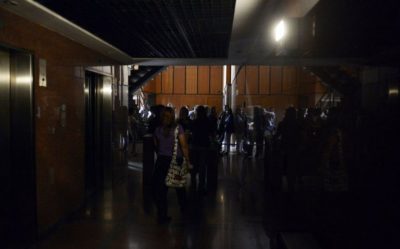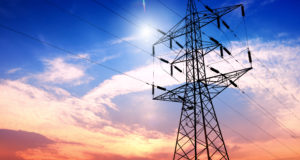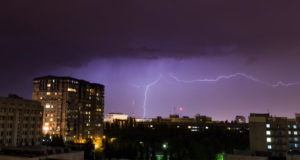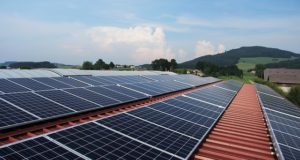
image credit news.yahoo.com
A failure of the power grid left 70 percent of the nation of Venezuela without electricity in early September.
Venezuela was the world’s eighth-largest net oil exporter in 2010, and, the same year, had the second-largest natural gas reserves in the Western Hemisphere.
The power line failure blacked out 14 of the country’s 23 states and the nation’s capital, Caracas, President Nicholas Maduro said. The cause of the blackout was not readily apparent, but Maduro blamed “right wing” opponents and claimed the power grid was sabotage.
A more likely explanation is that Venezuela’s aging and outdated infrastructure simply broke down, critics said, and that Maduro, who is the former energy minister, is trying to protect himself from blame. Maduro’s predecessor, Hugo Chavez, badly neglected Venezuela’s infrastructure and spent the nation’s money on social programs and a bloated military budget. Nicholas Maduro has continued Chavez’s self-serving policies. He was Chavez’s protégé.
It Can Happen Here
Americans and Canadians that will scoff at the possibility of such a catastrophe occurring in North America are sadly mistaken. Recent news stories indicate that North America’s grid is bad shape, too.
A large percentage of the US power grid and the equipment that support it are in poor condition, according to a report from the American Society of Civil Engineers. The same report card gave U.S power systems a D+ rating and warned that some of the equipment in use dates to the 1880s.
The grid’s reliability is declining as well; the number of major power outages in the United States has more than tripled since 2007. There were 76 such outages in 2007 and 307 in 2011.
Harness the power of the sun when the power goes out…
The data means that some of the US power grid might be older than that in Venezuela. The US grid is also very vulnerable to sabotage and cyber attacks, according to the report card.
Days before she left her post, former Department of Homeland Security Secretary Janet Napolitano said she believed a cyber attack was inevitable.
“Our country will, at some point, face a major cyber event that will have a serious effect on our lives, our economy and the everyday functioning of our society,” she said. “While we have built systems, protections and a framework to identify attacks and intrusions, share information with the private sector and across government, and develop plans and capabilities to mitigate the damage, more must be done, and quickly.”
Therefore, it might only be a matter of time before a power outage like that in Venezuela hits the United States and Canada. The American grid is interconnected and very vulnerable to weather, sabotage and old-fashioned breakdowns.
The solutions are out there
Many families are already taking steps to provide their own power through such solutions as solar panels, fuel cells, microturbines, wind turbines, and small scale hydroelectricity. Those families might soon be the envy of their neighbors.
Americans need to take a look at what’s going on in Venezuela. The electrical grid in a large and fairly wealthy nation nearly completely collapsed. If such a failure can occur in a nation that has the world’s largest proven oil reserves, it can happen in the United States of America, which has the world’s largest economy.
It is time that Americans embrace small-scale electricity generation as families and as a nation. The technology to give every family and business the ability to produce its own electricity exists. We need to start using it before we join the people of Venezuela — in the dark.
 Off The Grid News Better Ideas For Off The Grid Living
Off The Grid News Better Ideas For Off The Grid Living




